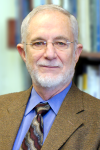Thomas H. Brown
Professor of Psychology, Professor of Cellular and Molecular Physiology
 Thomas H. Brown, B.A. San Jose State University, Ph.D. Stanford University, faculty member at Yale since 1988: You have made many fundamental contributions to the neuroscience of learning and memory, particularly through your many highly cited studies of synaptic plasticity. In a highly influential paper in the journal Science, you were the first to demonstrate that long-term potentiation, a form of synaptic plasticity in which a neuron’s firing is enhanced as a consequence of prior strong activation, could be demonstrated in the sympathetic cervical ganglion, and thus not restricted to the hippocampus where it was first discovered. This core study established the ubiquity of synaptic learning mechanisms throughout the nervous system.
Thomas H. Brown, B.A. San Jose State University, Ph.D. Stanford University, faculty member at Yale since 1988: You have made many fundamental contributions to the neuroscience of learning and memory, particularly through your many highly cited studies of synaptic plasticity. In a highly influential paper in the journal Science, you were the first to demonstrate that long-term potentiation, a form of synaptic plasticity in which a neuron’s firing is enhanced as a consequence of prior strong activation, could be demonstrated in the sympathetic cervical ganglion, and thus not restricted to the hippocampus where it was first discovered. This core study established the ubiquity of synaptic learning mechanisms throughout the nervous system.
You later moved the field concerned with the cellular mechanisms of learning substantially forward by demonstrating that associative long-term potential, a mechanism by which weak synaptic inputs on one part of a neuron are strengthened by their temporal contiguity with strong synaptic inputs on another part of the neuron, can be demonstrated in an in vitro hippocampal slice preparation. You showed that long-term potentiation in an axial slice of hippocampus can be readily manipulated pharmacologically allowing you and scientists throughout the world to conduct a deep biochemical analysis of neuronal circuits critical for learning. You put scientific meat on the bones of Hebb’s famous conjecture about “cells that fire together, wire together”—now a central tenet in computational deep learning—by elegantly describing its neurophysiological basis.
Your scientific research—resulting in more than 100 published articles—was generously funded through highly competitive grants from the National Institutes of Health, the Office of Naval Research, the McKnight Foundation, and the State of Connecticut. You were recognized by the latter through your election to the Connecticut Academy of Science and Engineering.
You were a teacher with a varied range of interests. You taught generations of Yale undergraduates the fundamentals of neuroscience through your well-regarded courses in “Brain and Behavior,” and “Psychopharmacology.” You also taught insightful, and enduringly popular, seminars on the “Science of Free Will” and “The Psychobiology of Emotion and Reason.” You mentored many graduate students and post-doctoral fellows who went on to productive careers. You were an executive committee member of the Interdisciplinary Neuroscience Program at Yale, and the founding director of the Center for Theoretical and Applied Neuroscience. For your contributions to Psychology and to teaching and learning at Yale over thirty years, your colleagues thank you and wish you a happy and productive retirement.